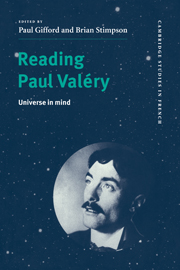Book contents
- Frontmatter
- Contents
- Contributors
- Abbreviations
- Introduction
- PART 1 SELF-SCIENCE
- PART 2 SELF-WRITINGS
- 6 The poetics of practice and theory
- 7 ‘Esprit, Attente pure, éternel suspens …’: Valéry's prose poetry
- 8 Counter-fiction
- 9 The Dialogues and Mon Faust: the inner politics of thought
- 10 Major poems: the voice of the subject
- 11 Other voices: intertextuality and the art of pure poetry
- 12 Manuscript steps: ‘Les Pas’
- PART 3 BODY, MIND, WORLD
- Conclusion
- Bibliography
- Index
- Cambridge Cultural Social Studies
10 - Major poems: the voice of the subject
Published online by Cambridge University Press: 04 August 2010
- Frontmatter
- Contents
- Contributors
- Abbreviations
- Introduction
- PART 1 SELF-SCIENCE
- PART 2 SELF-WRITINGS
- 6 The poetics of practice and theory
- 7 ‘Esprit, Attente pure, éternel suspens …’: Valéry's prose poetry
- 8 Counter-fiction
- 9 The Dialogues and Mon Faust: the inner politics of thought
- 10 Major poems: the voice of the subject
- 11 Other voices: intertextuality and the art of pure poetry
- 12 Manuscript steps: ‘Les Pas’
- PART 3 BODY, MIND, WORLD
- Conclusion
- Bibliography
- Index
- Cambridge Cultural Social Studies
Summary
In relation to his nineteenth-century predecessors, Valéry inaugurates a newly critical relationship to poetry, its illusions, its glamorous pretensions, its powers of magic spell-binding or ‘charmes’. His violent inner crisis of 1891–2 led him, abidingly, to relativise ‘la chose littéraire’. He stood aside at that point from the prevailing symbolist mysticism, opting resolutely instead for the Intellect. He ceased to treat Art as an absolute and undertook to limit the status of writing to that of one mind-generated activity among others.
This withdrawal, this renunciation or this denial, was, however, such as to lend itself to over-simple and stereotyping interpretations, which have, for half a century and more, distorted the appreciation of his poetry. Referred predominantly to this intellectualist stance, Valéry's poems have often been read simply as exercises of style excluding any inner authenticity or expressive virtue. Yet Intellect is no more to be considered the defining element in Valéry's practice of poetry than it is to be viewed as a secondary contributor. If, as poet, he indeed subjects the creative process to a wide-awake critical scrutiny of high technicity, maximising its action and effect, such scrutiny functions in the service of a complex process of composition which aims essentially at what Valéry terms ‘l'obtention de la voix’ (‘obtaining the voice’) (C2, p. 1077): an aim which, in his view, defines the characteristic quality of ‘pure’ poetry (a poetry, that is, purged of non-poetry, raised to the power of its own poetic essence) and which he sees as compatible with, indeed complementary to, the enunciation of a subject voice.
- Type
- Chapter
- Information
- Reading Paul ValéryUniverse in Mind, pp. 170 - 186Publisher: Cambridge University PressPrint publication year: 1999

